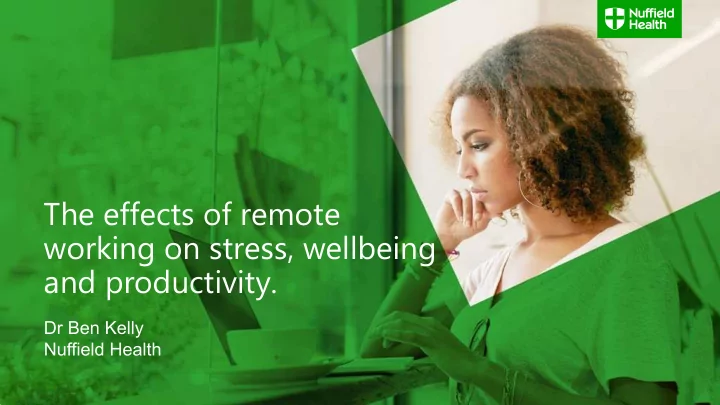

The effects of remote working on stress, wellbeing and productivity. Dr Ben Kelly Nuffield Health
Context. Remote working is on the rise. 74% Jump in the number of people working 4.2 million people regularly worked from from their own home between 2008 and 2018 home in 2015 (Office of National Statistics). (Office of National Statistics). Improved technology allows Remote working + ‘hot desking’ Allows employees to more employees to remain connected saves employers space and cohesively integrate work and to work from remote locations overhead costs . home demands. (e.g. email, skype etc.).
Where does the debate lie? "To become the absolute best place to work, communication and collaboration will be important, so we need to be working side by side. That is why it is critical that we are all present in our offices.“ (Chief executive of Yahoo – 2013) “It’s easier to attract top talent when you are open and flexible - It’s not effective or productive to force them to behave in a conventional way.” (Richard Branson – Virgin Group founder)
Why investigate remote working? Remote working can influence a number of factors relating to the performance, wellbeing and longevity of employees. Health. Wellbeing. Productivity. Job satisfaction. Turnover intention. Pleasing the ‘talent’.
Aim. To systematically review the published literature that has examined the associations between remote working and stress, wellbeing, health and productivity. To arrive at some practical recommendations that you may not typically see from similar work.
Methods. Systematic search of the literature. Cross-sectional Prospective/ Cohort studies. Case-control studies. studies. longitudinal. 1995 2019 Articles published between 1995 and 2019 in English • Participants work remotely, defined as: spending at least one day a week of their working time away from their office (e.g. home, another company site, hotel or train). • Study uses a validated measure of stress (defined as a state of psychological distress or suffering, including depression and anxiety), and/or wellbeing (including loneliness) and/or productivity and/or uses a measure of health as an outcome.
Methods. 22 studies 7,472 individuals Accounting, insurance, Small and large I.T, finance, companies telecommunications, university staff. Remote workers, non- remote workers, managerial and non- Quality range managerial staff.
Demographic breakdown. All studies bar one included both men Ages range from and women (one study with women 18 to 60. solely). Data from: US Federal agency, Telecommunications, IT, Finance, Government, Education, Business services, Accountancy firms, University, Supply chain management, Insurance, Consultancy Services.
Results.
Results. Study outcomes. 0 3 stress 14 wellbeing productivity health 15
Effects of remote working on wellbeing. 1 2 Outcomes measured included job Overall the effect of remote working on satisfaction, need for recovery and work/life wellbeing was positive. balance. 3 4 Increased job satisfaction and work/life Effects mediated by relationships with balance, reduced turnover intentions. managers, co-workers and family.
Factors to consider. 1 2 3 Use of technology in Possible U-shaped relationships Use of advanced technology appropriate ways can improve between amount of remote working reduced turnover intentions. communication. and job satisfaction. 4 6 5 With greater autonomy the In some circumstances home is association between remote Social connectedness moderates seen more as a place of demand working and wellbeing may be wellbeing in remote workers. and less of restoration. more positive.
Effects of remote working on stress. 1 2 Outcomes measured included job stress, The relationship between remote working exhaustion and psychological strain. and stress is mixed. 3 4 Remote working could be associated with Remote working could lead to reduced work work overload and role ambiguity added to stress, work exhaustion and turnover worker strain and increased work/family intentions. conflict.
Factors to consider. 1 3 2 4 In some studies the Sufficient organisational Adequate support from Role ambiguity and associations between support found to reduce the organisation can invasion of privacy are stress and remote isolation and strain and buffer exhaustion and factors in the remote working varied mediate the impact of reduce turnover working stress depending on intensity of exhaustion. intentions. relationship. remote working.
Effects of remote working on productivity. 1 2 Part-time teleworkers reported higher levels Outcomes measured were job performance of concentration at home compared to the and concentration. office. 3 4 Isolation negatively associated with job No effects of homeworking on performance. concentration.
Factors to consider. 1 3 2 Only three studies measured Cannot draw conclusions Further work is needed. productivity with conflicting results. based on this.
Individual differences. Openness Rumination People high on openness may adapt well (increased positive If you have high affect) to remote rumination then remote working working may be bad for your wellbeing. Connected Isolation If you are more socially connected you benefit Professional isolation is more from working at negatively associated home. with job performance.
Where the greatest positive impact is created from remote working Impact of remote working on stress Impact of remote working on wellbeing 50% 60% 45% 50% 40% 35% 40% 30% 25% 30% 20% 15% 20% 10% 5% 10% 0% 0% positive Negative Neutral positive Negative Neutral Stress Wellbeing
Practical guidelines. • Remote working will change the workplace dynamic. • Remote working is likely to continue to increase. “10–15 years ago at interviews people asked about salary and the company car, now the number one question I get asked is about the company's approach to flexible working” – Dawn Moore, Director of Human Resources at Morgan Sindall.
Thought piece for the future. Given the potential positive and Potential for Individual No obvious perfect negative effects of differences around development of ratio of remote remote working, training for home remote working working/non-remote what will your workers to reduce should be working. company’s approach considered. work/life conflict. to remote working look like?
Thank you. Any questions?
Recommend
More recommend